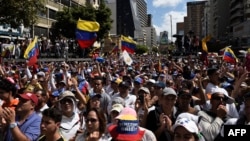Venezuelan opposition leader Juan Guaido says humanitarian aid would be brought into the country on February 23, even though President Nicolas Maduro has refused to let it in.
Guaido, recognized by the U.S. and some 50 other countries as the interim president of Venezuela, spoke Tuesday to thousands of supporters who demonstrated as part of an ongoing campaign to break the military's support for Maduro and force the socialist leader from power.
Guaido has been pressing for emergency food and medicine from the U.S. to be transported into the economically-devastated country. The supplies have been at a warehouse in the Colombian border town of Cucuta.
Maduro, who continues to enjoy the support of the country's powerful military, said the opposition rallies are part of a U.S. coup attempt and refuses to allow the emergency supplies to enter the country.
His foreign minister Jorge Arreaza, met with U.N. Secretary-General Antonio Guterres on Monday evening in New York. The U.N. chief has offered his good offices to both parties to help the country out of the present standoff.
Arreaza told reporters at the U.N. on Tuesday that the Maduro government wants to deepen cooperation with the world body, which currently works in the country on nutrition and health programs through UNICEF and the World Health Organization.
But he denied that the country is mired in a humanitarian crisis.
“There isn’t a humanitarian crisis in Venezuela, there is an economy in Venezuela that is subject to a blockade,” Arreaza said. He urged Washington to lift sanctions it has imposed on the country and free up funds it has frozen in U.S. and foreign banks.
Guaido, the National Assembly leader who surprised the world when he declared himself acting president on January 23 under constitutional provisions and said Maduro's presidency is "illegitimate" because of flawed elections.
Guaido is trying to oust Maduro from office so he can establish a transitional government and hold new presidential elections.
The South American country is grappling with a severe recession and hyperinflation while millions of citizens are lacking basic necessities.
The United Nations says more than three million people have fled the country since 2015.








